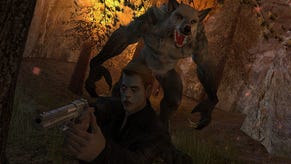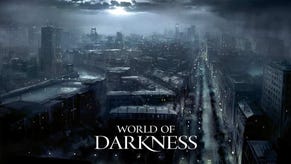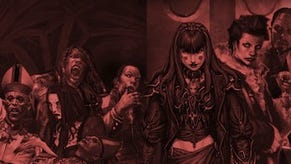The Top 25 RPGs of All Time #22: Vampire: The Masquerade - Bloodlines
It spelled the end of a great RPG studio, but Vampire: The Masquerade lives on.
This article first appeared on USgamer, a partner publication of VG247. Some content, such as this article, has been migrated to VG247 for posterity after USgamer's closure - but it has not been edited or further vetted by the VG247 team.
Vampire: The Masquerade begins with a series of questions. Here's one of them: "Being a 'night person,' you watch a lot of late night TV movies. Three movies are on—which one do you watch?"
The answers to these questions eventually land you in one of seven vampire clans, ranging from the fairly conventional Brujah to the much more... uh... unconventional... Malkavians. Your choice is the crux of Vampire: The Masquerade, which puts more emphasis on roleplaying than any game on this list barring maybe Planescape Torment. This is hardly a surprise given that it's based on one of the earliest mainstream LARPs (Live-Action Roleplaying).
Based on the popular World of Darkness tabletop RPGs, Vampire: The Masquerade - Bloodlines has a rich RPG heritage. It was originally developed by Troika, which was founded by three of the original creators of Fallout, including legendary developer Tim Cain. Featuring a sprawling, in-depth storyline, it was one of the most ambitious RPGs of its time, utilizing the same engine as the then-new Half-Life 2.
As envisioned, it cast players as a newly-turned bloodsucker negotiating the labyrinthian twists and turns of vampire culture and politics, with a special emphasis on how their chosen clan affected the story. Taking on the role of a Toreador, for example, would encourage players to use their beauty to attract and subdue foes, while playing as a hideous Nosferatu would limit them to the sewers. It was set in four sections of Los Angeles, each with its own factions and challenges.
As with so many other epic RPGs, Vampire: The Masquerade's scope got the better of Troika's comparatively small team. It suffered from demands for a multiplayer mode; the strain of developing multiple styles of gameplay, and drama including the Source engine code being leaked. Activision finally pushed it out the door after three years of development. Riddled with bugs, it sold poorly.
"It was dumped on the market at the worst possible time—most people didn't even know we were out," former lead writer Brian Mitsoda told Eurogamer back in 2014. "Both fans and the Troika devs are always going to wonder what the game could have been like with another six months."
That should have been that. Troika laid off most of its employees two months after Vampire: The Masquerade's release, shutting its doors for good in February 2005. If not for the fan community rallying to produce unofficial patches of its own, Bloodlines would be just another ambitious but ultimately failed RPG.
But beginning shortly after its release, first Dan Upright, then Werner Spahl, spearheaded community updates that addressed technical issues, restored cut content, and rebalanced the gameplay. The Unofficial Patch, as it's known in the community, has received almost annual updates for more than a decade now. The most recent version was released this past March, bringing with it new music, details, and still more fixes.
A passionate and loyal fandom has since grown up around Bloodlines. A running joke is that whenever it comes up in conversation, someone will invariably reinstall it. It's easy to understand why: the varied clan storylines, sidequests, and outcomes make Bloodlines extremely replayable.
Its best moments still hold up well today. One of Bloodlines' most famous quests is The Ghost Haunts at Midnight—an eerie mission set in the Ocean House Hotel. Inside you find dark, claustrophobic corridors; rattling chandeliers, and ominous laughter. A ghost flits past just out of sight while the walls shake and telephones ring for no reason. It's a showcase quest that demonstrates Bloodlines' often incredible range.
Another one of its more famous twists features two sisters named Therese and Jeanette Voerman. Therese serves as the Baron of Santa Monica and is often at odds with her sister, who contrasts Therese's conservative outlook with a midriff-exposing shirt and sexy miniskirt. The two battle for dominance throughout their arc until it finally comes to light that they are in fact the same person—a Malkavian with Disassociative Identity Disorder. It's up to the player to decide whether to let one personality dominate, or to try and get them to make peace and become one.
This being 2004, when PC games in particular were pushing the genre's boundaries, Bloodlines invariably wanders into some dark territory. The Therese/Jeanette split, for example, arises from a twisted story of child abuse by their father, the cirumstances varying depending on which personality you ask. Understanding that playing a vampire who must regularly feed on human beings is pretty horrific by itself, Vampire: The Masquerade fully embraces its violent subject matter.
It's aided by some first-rate voice acting, led by John Dimaggio, who is best known for his role as Bender in Futurama. His character, Smiling Jack, is the vampire who welcomes the player into Los Angeles for the first time. And like everyone else, he has an agenda. Full voice-acting was perhaps one more example of Troika's grasp exceeding its reach; but in this day and age, its very welcome.
Sadly, owing to its unfinished state, Vampire: The Masquerade's quality takes a hit toward the end, its complex politicking making way for its weakest element: the flailing and uncomfortable combat. But up until that point it's absolutely grand in the way that it requires to maneuver and survive amid the scheming of the various vampiric factions.
Alec Meer on our sister site RPS wrote, "There is so much wrong with Bloodlines, and it isn't [aging] as well as one might hope. It doesn’t matter. None of it matters. Because there is so much right, so much that seems somehow more startling now. This was a game from Activision. Activision! And it's about sex and abuse and power and sadism and humanity and loss and regret and, yes, also a lot of fighting things in tunnels. Its heart is dark, its mind inquiring and it haunts my memory still."
These days Vampire: The Masquerade - Bloodlines is a beloved cult favorite, its loyal community and continual development keeping it in the public consciousness long beyond its expiration date. As I've said more than once already, one of my chief criteria in compiling my list of the Top 25 RPGs is longevity. RPGs are above all about the power of possibility, the freedom to explore many different avenues of character development, whether through story or through gameplay mechanics. Vampire: The Masquerade - Bloodlines goes further than most in that direction.
For all of its bugs and questionable gameplay choices—most especially the decision to lean hard on first-person gunplay in the final act—the raw strength of its design still has the power to grab fans. That, ultimately, is what has kept it alive all these years. And that's why it's one of the best RPGs ever made.







